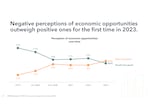
Downtown Portland as seen March 2, 2023.
Kristyna Wentz-Graff / OPB
The majority of voters in the Portland metro area continue to have a negative view of the direction of the city – and of local governments surrounding Oregon’s largest city.
Portland-based DHM Research surveyed 500 voters in the Portland-metro area spanning parts of Multnomah, Clackamas and Washington counties. The research firm has partnered with the Portland Metro Chamber for 12 years on the survey gauging voter sentiment on the top concerns for the region. The poll was conducted from Dec. 13 through 19. The survey is designed to garner responses from a variety of ages, political affiliations and areas, according to DHM Research, and has a 4.4% margin of error.
“We start with just a general gauge of where people are, and we ask them how they feel about the direction of the county that they live in,” DHM president Michelle Neiss told reporters on Wednesday. “Overall for the region, collapsing across all three counties, what we see is that 51% think that their county is on the wrong direction, which is a continuation of fairly negative sentiment that we’ve had for the past few years.”
Voter sentiment trended negative in multiple categories. Just over half of respondents said Portland is moving in the wrong direction. Eight in 10 said quality of life in Portland is getting worse. Half of voters said they are worse off now than they were two years ago. For the first time, more people said they had a negative view of future economic opportunities instead of a positive one.
“This is a shift from previous years where maybe positivity, or neutral, outweighed negativity,” Neiss said. “That is definitely a signal to pay attention to. It’s fairly sobering.”

In a graph provided by DHM research, survey respondents' perceptions of economic opportunities in Portland have declined since 2019, with more people saying they are poor/very poor than good/very good in 2023.
Courtesy DHM Research
When asked an open-ended question about the region’s top concern, 40% named homelessness as the biggest issue facing Portland. That’s in line with past surveys. Voters also listed issues often associated with homelessness, such as drug use and addiction, safety and crime, and affordable housing.
The survey results come as the Oregon legislature begins its short five-week session. State leaders, including Gov. Tina Kotek, have listed affordable housing and the state’s addiction crisis as top issues in the session. The Portland Metro Chamber lobbies in the capitol on behalf of its more than 2,000 member businesses and organizations.
The voter sentiment poll also comes as other economic indicators show the economy is recovering from the pandemic downturn. Falling inflation is restoring confidence among economists that the U.S. will avoid a recession, and consumer spending remains strong. On top of that, unemployment across the country is low, and is clocking in near historic lows at just 3.7% in Oregon.
Still, Portland Metro Chamber vice president Jon Isaacs said even though there are signs the city is recovering from the pandemic, the survey shows there’s still a perception problem with voters.
“We also have to respect the perspective that residents of the region have and understand that we are in for a long haul until people who live here – voters, taxpayers – start to feel that difference,” Isaacs told reporters. “And we’re not there yet.”
